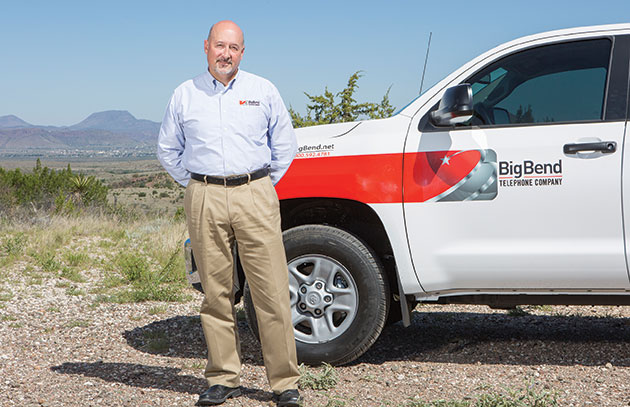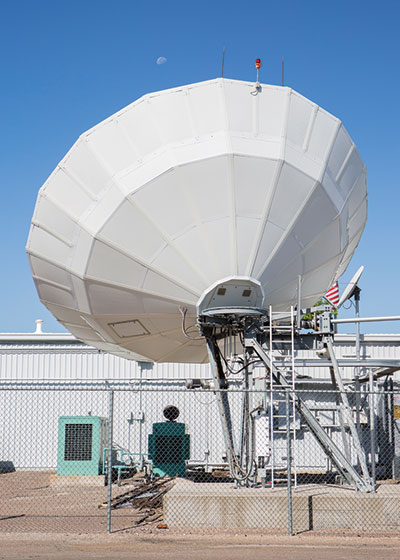
General Manager Rusty Moore, above, says Big Bend Telephone Co. meets its rural customers' unique needs by supplementing telephone lines with microwave, satellite, DSL and fiber optics.
Photo by Jennifer Boomer
Life can be lonely in the Big Bend country of far West Texas. The region is among the most rugged and remote areas in the nation.
That's why it is particularly important for residents here to have reliable telecommu-nications services connecting them to each other and to the outside world.
But providing service throughout this sparsely populated region isn't cheap or easy, and it's certainly not a market that appeals to the big-name telecoms.
Fortunately, Big Bend Telephone Company, a homegrown telecom that's headquartered in Alpine, has pioneered technology that allows folks here to reach anyone, anytime, anywhere. The family-owned company serves 4,900 telephone access lines and 2,800 broadband customers, many of them farmers and ranchers, who otherwise might not have dependable service.
Serving Ranchers, Businesses and Border Patrol
"For 66 years, the Haynes family, who owns the company, has brought in the latest telecommunications technology," says Rusty Moore, general manager and chief operating officer of Big Bend Telephone. "We serve all kinds of customers, from ranchers living off the grid to Homeland Security officers guarding the border."
The company's footprint runs along 485 miles of the Texas-Mexico border. Serving the U.S. Border Patrol, state and local law enforcement agencies, schools and medical providers is critical. Big Bend National Park, with its mountains and desert landscapes, lies at the heart of the telecom's territory, as does the McDonald Observatory, a world-renowned research institution.
Beyond these notable customers, Big Bend Telephone makes it possible for the average person to run a home or business.
Building a Hybrid Network
Big Bend Telephone was started in 1960 by Neville Haynes, who had returned home to ranch after serving in the U.S. Navy during World War II. He became interested in the potential benefits of mobile radio communications to remote ranches like his, and when the drought of the 1950s dried up his ranching plans, he saw an opportunity to link his community to the world through telephone service. Other phone companies refused to serve a place with so few customers, but Neville made it work.

Satellites and wireless signals combine with copper wire and fiber optics to bring data to the remote Big Bend region.
Photo by Jennifer Boomer
Since then, three generations of the Haynes family have supple-mented traditional telephone lines with microwave, satellite, digital subscriber line (DSL) and fiber optics. Solar power extends the company's reach beyond the electric grid.
"We have built an advanced hybrid network to satisfy our unique customer demands," says Moore, who's been with the company for 25 years.
For example, to reach one remote cus-tomer, the company starts with fiber at a central office, sends a wireless signal to a mountaintop, hops down via an Ethernet broadband loop, and reaches the custom-er's home through copper wire.
"Our customers need us to move more data, faster," Moore says. "That's why we continue to transition from a telephone company to a broadband provider."
High Cost of Low Population Density
Delivering the latest technology to 18,000 square miles of rugged terrain is not nexpensive. There are just 0.33 customers per square mile to cover costs. Compare that to New York City, with 27,000 people per square mile.
Most Americans are familiar with the nation's big telecommunications firms, such as AT&T and Sprint. Many people don't realize, however, that about 1,000 independent telecom companies — including coop-eratives and private businesses like Big Bend Telephone — also operate in rural America.
Rural service providers receive assistance from federal and state Universal Service Funds (USFs), designed to assure afford-able telecommunications anywhere, including to schools and rural healthcare facilities.
"There is no business case that will support the cost of serving this area without USF support," Moore says. "We are a poster child for the importance of USF to rural America."
"The relationship with CoBank and Farm Credit has been paramount in advancing communications in this extremely rural area."
– Rusty Moore
The company also receives financing from Farm Credit, which was given authority in the '80s to lend to utilities and telecommunications companies that support the infrastructure of rural communities. Today, three Farm Credit cooperatives work together to finance Big Bend Telephone: CoBank, the Farm Credit Bank of Texas and Capital Farm Credit, the local farmer-owned lending co-op serving far West Texas.
"The relationship with CoBank and Farm Credit has been paramount in advancing communications in this extremely rural area," Moore says. "They have been exceptional partners in our mission."
It's a mission that dovetails with Farm Credit's mission of supporting agriculture and rural communities.
Meeting Rural Needs
"Service provided by companies like Big Bend Telephone is critical for people to live and work in rural areas," says Lennie Blakeslee, relationship manager with CoBank.
Nick King, vice president and capital markets officer at Farm Credit Bank of Texas, adds, "Big Bend Telephone plays a vital role in national security. If they weren't here, who would serve this place?"
Whether you're a Border Patrol agent accessing a remote surveillance camera, or a rancher checking weather, e-mail or futures markets on a smartphone, Big Bend Telephone finds a way to meet your needs.
The NTCA–Rural Broadband Association recently recognized the company with a Smart Rural Community Showcase award for helping to make rural communities vibrant.
"Earning this recognition was just part of the journey," Moore says. "We will continue to create next-generation applications and platforms for our communities."
– Nancy Jorgensen